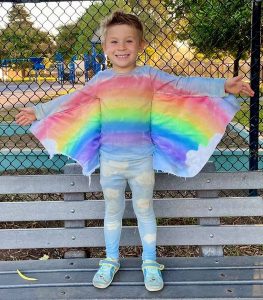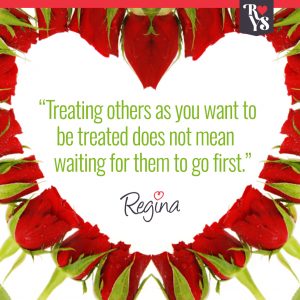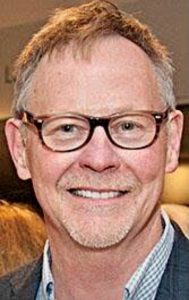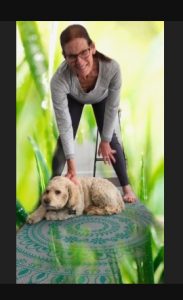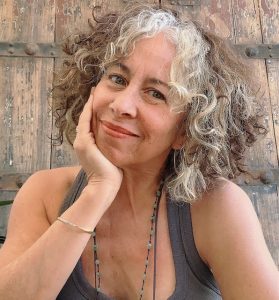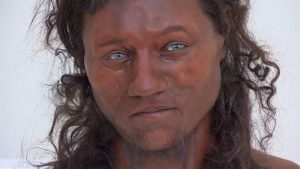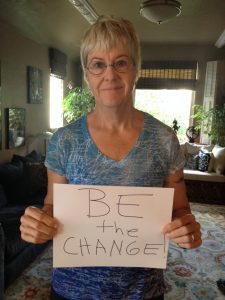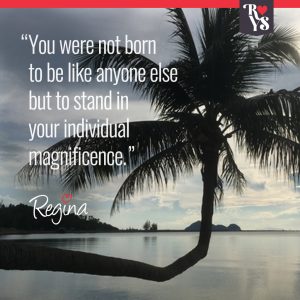
Do you compare yourself to other people? Do you compete with them?
I used to, until I had a life-changing awareness when I was looking through a fashion magazine while waiting for a doctor’s appointment. I flipped through the pages looking at the thin models with seemingly perfect skin. For a brief moment, I thought how wonderful it would be to be young again with a perfect body, skin, hair, nails, teeth, and gorgeous looks.
Then I woke up and realized what I was doing. What in the world are you thinking, I sort of half-screamed to myself, inside my head, of course. Old patterns die hard, don’t they?
When we realize we are each born unique we wake up to what a joke it is to even entertain the notion we should be like another person. Although you have heard this before we are indeed like a fingerprint or snowflake. We were designed to be individuals unlike any other person on earth. At no time in the past or future will there be another Regina. At no time in the past or future will there be another you. So what in the world would you and I be doing to ourselves if we bought the lie we should be like other people, should look a certain way, or wear a certain size, or marry a certain person, or make a certain amount of money – or, fill in the blank.
I think we grow up comparing ourselves to and competing with others. Was I as pretty as the other girls? No. Was I as smart as other people? No. Was I as clever, funny, popular? No. It seemed in every area where I compared myself to others, I fell short.
Even though I was taught to compare myself to others through television advertising, peer pressure, teachers, and my parents comparing me to my sister, it did not feel good. Was life really supposed to be a competition with other people? How could this be the goal of life when I was not like other people? I am me, a unique individual.
Looking at those rail-thin models in a fashion magazine, comparing myself to them, felt bad. I felt less than some ideal height, weight, and look. I felt unattractive which led me to feel unworthy. Comparing myself to anyone always leaves me feeling negative. Even when the comparison makes me think I am better, more attractive, smarter, it still leaves me feeling bad. Maybe I am smarter than another person, but my intelligence does not make me better.
One of the most empowering actions I take is refusing to compare myself to or compete with others in the unhealthy ways. Today I work hard to only compare and compete with myself in a healthy way: to be a better person today than I was yesterday. I am focused on supporting people to be their unique selves and to achieve their individual goals, just as I want to be supported in achieving my goals and to be accepted for who I am.
Imagine how our lives will change, and those of our children, friends, family, co-workers, when you and I refuse to compare or compete with one another. Sure, team sports can help build self-respect, cooperation, good sportsmanship, motivation to excel, and the drive to be better through practice and hard work. But placing ourselves up against other people as a way to gauge our worth and value is unhealthy and only leads to feelings of inadequacy and frustration.
Refuse to compete with anyone on looks. You and I are beautiful as we were born to be. We can take care of our looks through rest, diet, and exercise. We can take good care of our skin through vitamins, moisturizers, sunscreen, and not eating sugar and processed foods. We can look our best as we were born to be. So it is healthy to compete with ourselves to take good care of ourselves to honor our individual looks.
The same is true of competing with anyone on weight. The goal is to feel good in your body. The goal is to be healthy. You and I are not meant to be the same size. We are meant to respect and honor our bodies through eating healthfully, exercising, not using food as an excuse to stuff our emotions, or feelings of unworthiness or shame, or to reduce boredom. We are to compete with ourselves to find the healthy weight for us, to maintain our desired weight, and to do whatever it takes to keep our body in optimum condition.
Also, refuse to compete with anyone on money. Set your financial goals based on what you deem successful. Some of the richest people I know are the poorest as far as integrity and fulfillment. And, some of the poorest people I know are the richest in terms of satisfaction, generosity, and joy. Being true to you requires you to compete with yourself to be financially responsible by refusing to surround yourself with stuff in an attempt to make you feel whole. Things do not ever fill the holes within our heart. Only self-love and respect do.
When you refuse to compete with anyone on anything you are honoring the truth: you are distinctive among all other human beings. You are respecting the fact you have been specifically designed to be yourself.
When you allow your uniqueness to shine without comparison or competition, you will be most fulfilled. Be proud to be you! Appreciate you are the only one of you there is or ever will be. Work to be a better person today than you were yesterday; a healthy competition that is good for your soul.
Start now by learning to pay attention to how you compare yourself to others. Each time you find yourself going down the “I am not as good as,” or “I am not as pretty (or smart, or funny) as” road, stop yourself. Intentionally end your ego’s competition and comparison. Turn your attention to how you are unique and valuable as you are. If there are negative aspects about your behavior you want to change, get busy competing with yourself to stop smoking, overeating, being codependent, spending without responsibility — whatever makes you feel less than.
You have the power to change anything about yourself you want to. First, make a list of what you want to change. Second, choose one item from the list. Third, make the decision to do whatever it takes to accomplish your goal. Fourth, do not give up and refuse to compare yourself or compete with anyone – even if you have a friend who is doing the same thing, like losing weight or quitting smoking.
You are an individual. Your body, metabolism, or addiction level is different than your friends’. Do not go down the “she is losing faster, stopping faster, etc.,” road. Support one another so you both accomplish your goals. Refuse to compete with one another. Compete with yourself and support her. Healthy competition is good for your soul. When you only compete with yourself, you can define what success truly means to you.


